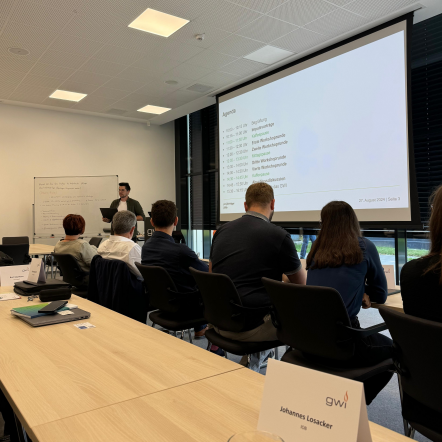Our colleagues Nico Schmitz (lecturer), Moritz Diewald, Christopher Wünning, Johannes Losacker, Hannah Kaiser, Linda Giesler, Lukas Sankowski and Elsa Busson were at the Gas- und Wärmeinstitut (GWI) in Essen on 27 August 2024 to discuss various issues relating to the use of hydrogen in thermoprocessing plants as part of a hydrogen workshop.
The workshop, organised by Projektträger Jülich and the GWI, began with four keynote speeches from various institutions. These included the IOB, represented by Nico Schmitz, as well as the TU Bergakademie Freiberg, the BFI (VDEh Betriebsforschungsinstitut GmbH) and the GWI itself.
The keynote speeches each addressed a specific issue of the workshop:
- How much hydrogen can be added to the natural gas in existing systems without hardware modifications?
- How must the existing plants be adapted in order to be able to operate them with higher hydrogen admixtures or even 100% hydrogen?
- What effects does the changed combustion atmosphere in the plant have on the thermal product?
- What effects does the changed combustion atmosphere have on the plant itself, e.g. the furnace lining?
In the subsequent discussion rounds, the participants had the opportunity to discuss the previously presented questions in small groups. The most important findings from the discussion rounds were then summarised in the large plenary session.

Of particular interest in this form of workshop was the fact that industry and research institutions came together in a closed setting and were able to discuss openly. The coffee breaks were used to get to know the various institutions and make new contacts. The hydrogen workshop concluded with a guided tour of the Gas and Heat Institute in Essen.
The constructive discussions and keynote speeches provided various insights into the current state of research on the use of hydrogen in thermoprocessing plants at the different institutions. Overall, it can be said that each plant presents different challenges and individual decisions must be made on how to deal with these difficulties. The exchange was very valuable for the IOB in order to gain an insight into the experiences of the other participants.
We would like to thank Projektträger Jülich and the Gas- und Wärmeinstitut Essen for inviting us to this interesting and informative hydrogen workshop and look forward to the next opportunity to discuss the current state of research.

